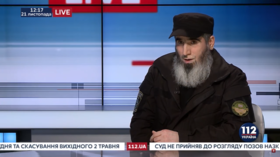'UK, US look at jihadist groups as useful, are they as against terrorists as they pretend to be?'
A Times' article portraying Chechen jihadists as freedom fighters because they are anti-Russian is an attempt to whitewash a connection between the Ukrainian government and terrorist groups, former US diplomat Jim Jatras told RT.
The British newspaper published a highly controversial interview with a Chechen who is fighting against anti-government forces in Eastern Ukraine. The head of his battalion earlier admitted that his fighters waged jihad in Syria and that the leader was even part of a terror group committing atrocities in Russia.
"Some of the battalion's gunmen admit to having honed their combat skills at Islamic State (IS, formerly ISIS/ISIL) training camps in Iraq and Syria," the article says.
Former US diplomat Jim Jatras, commenting on the timing of the article to RT, said that the editorial decision to let this information out now is perhaps because "somebody just discovered the significance of it" especially in light of President Trump's announcement to withdraw US troops from Syria after Islamic State's defeat.
He said that it has been known since 2014 that there are "Chechen fighters on the Kiev government side".
"This has been a magnet for anti-Russian elements from all sorts of countries, Georgia and from Europe, people fighting with these non-governmental militias that are allied with the Ukrainian forces. And some of them are very extreme, very radical ideologically. This should come as no surprise that somebody admits that they have this relationship with ISIS," he said.
The British establishment, including the media and intelligent services, have been at the forefront of the anti-Russian campaign even before the 2016 US presidential election, according to Jatras. "They even had this entire group that was set up within the British government to generate anti-Russian press material."
The point of this "disinformation against Russia", he said, is "not only to blacken Russia but to make sure there could be no rapprochement between Moscow and Washington as Donald Trump has said he wants to have. And this effort has been wildly successful."
"Portraying these Chechen jihadists as 'freedom fighters', because they are anti-Russian wouldn't be necessarily unusual for the British media and you would expect that," Jatras said.
In his view, "the real tit-bit was the fact that somebody overlooked the significance of these fellows admitting that they have this relationship with the Islamic State which supposedly is the big enemy that we have been fighting against in Syria… But nothing could be farther from the truth."
Jatras suggested that the US' real reason for being in Syria is "to try to get rid of the Assad government and also to block the Iranians and to thwart the Russian effort in that country."
He said that IS "at best has been a kind of 'frenemy' that we treated as an enemy sometimes but also find it useful for larger political goals there."
He thinks this story isn't "all that surprising given the bent of the British media."
Jatras believes the article to be an intentional attempt to whitewash the connection between the Ukrainian government and terrorist groups "while knowing that they are cooperating with the Ukrainian government."
The government in Kiev is chaotic, weak and "at the mercy of the extreme nationalist elements," the former diplomat said.
"Of course they can't control these groups like Azov battalion and others on the field. It shouldn't be surprising that when they invite other radical groups to participate in the war that are nominally not part of the official Ukrainian forces, they also cooperate with them while allowing them to continue on an independent basis. I don't see how that morally whitewashes or isolates the Ukrainian authorities from the radical politics of these terrorists," Jatras noted.
In Jatras' opinion, these jihadists have been the biggest threat to the Western world for the last couple of decades, however, the UK and the US government don't look at this that way.
"They look at these groups as useful. And this has a long history, not only going back to the efforts against the Soviets in Afghanistan, but to Bosnia, to Kosovo, to Libya, to Syria… The idea that we don't have this long relationship with these groups is extremely naive," Jatras said.
"How many people put two and two together and say 'wait a minute, this doesn't smell right.' Why is our government, why is the British government, which is a close ally of the US, working with these terrorist groups? I thought we were against terrorism. And I think it is very hard for a lot of people to look at this and say 'wait a minute, maybe we are not as against the terrorists as we pretend to be?'"
Think your friends would be interested? Share this story!















